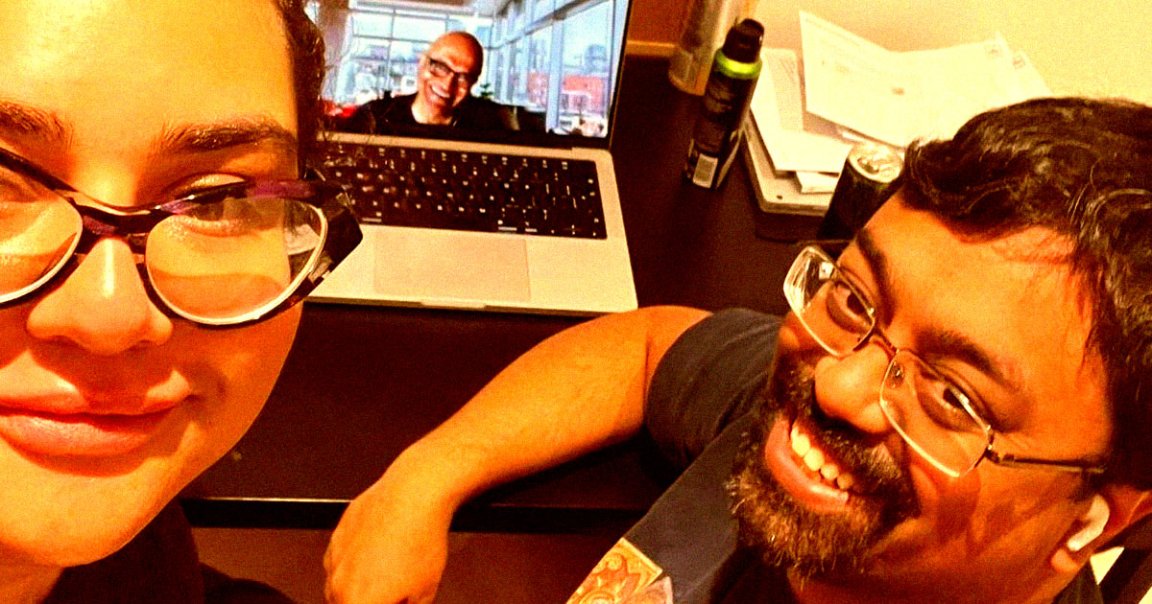
Former Stability AI CEO Emod Mostaque is ready to move on.
Mere days after the founder of the Stable Diffusion maker stepped down, Mostaque shared a selfie of himself on a video call with none other than Microsoft CEO Satya Nadella.
“He is above, below and around us,” he wrote in a tongue-in-cheek follow-up tweet. “In Satya we trust (because at this rate we’ll kinda have to).”
The news comes less than a week after three of the five researchers who originally created the foundational tech that powers Stable Diffusion at two German universities left the company after a string of other major departures.
It’s still unclear how or if any of these events are connected or what Mostaque and Nadella discussed during their call, but judging by the former Stability AI executive’s cryptic tweets, he won’t be joining Microsoft’s ranks any time soon.
“I’m just messing with you all, I’m doing my own thing(s),” Mostaque wrote in an equally vague follow-up. “But [Nadella] is the [goat emoji] of CEOs, amazing leader.”
Despite its name, Stability AI has been through a turbulent couple of years with Mostaque at the helm. Even before he founded Stability AI in late 2020, the British-Bangladeshi business executive had a history of making exaggerated claims, from a made-up master’s degree from Oxford to fibbing about a “strategic partnership” with Amazon.
In 2022, Stability AI made some key hires, including researchers from Ludwig Maximilian University of Munich and Heidelberg University in Germany, who laid much of the groundwork for the now popular AI image generator Stable Diffusion — but burned through millions of dollars in cash in the process.
Meanwhile, Microsoft has established itself as a key player in the ongoing AI race by investing billions of dollars in ChatGPT maker OpenAI.
In other words, it’s no wonder Mostaque is looking to get Nadella’s ear as he pursues “decentralized AI,” as he phrased it in a Stability AI statement issued over the weekend.
While Stable Diffusion generated plenty of buzz in the then-burgeoning AI image generator field by late 2022, the picture has changed dramatically since then. Multiple companies with far more resources to play with, including Google, Microsoft, and OpenAI, have since come out with their own competing models.
In the statement, Mostaque noted that he was “proud two years after bringing on our first developer to have led Stability to hundreds of millions of downloads and the best models across modalities.”
“I believe strongly in Stability AI’s mission and feel the company is in capable hands,” he added. “It is now time to ensure AI remains open and decentralized.”
But whether Stability AI’s remaining leadership, who now have to pick up the pieces, will be able to turn things around and find a sustainable business model remains to be seen.
For his part, Mostaque is now arguing that AI tech shouldn’t belong to a single entity.
“Who governs the datasets and models that teach your kids, run your hospitals, governments etc?” he asked rhetorically in a follow-up tweet today.
However, if OpenAI’s rocky history as an “open” non-profit is anything to go by, the AI space is arguably becoming far more centralized than decentralized. The Sam Altman-led company — and co-founder Elon Musk — quickly realized that training its AIs would take billions of dollars in funding, turning the firm from a non-profit into a closed-door, profit-driven entity starting in March 2019.
Over the last year, AI technologies have increasingly come to exist inside black boxes that belong to a dwindling number of large companies.
That reality hasn’t flown over the head of Mostaque, who’s seemingly now looking to lead a David versus Goliath fight against these entrenched players.
Whether he’ll succeed, however, is anything but clear. The cards are certainly stacked against him, which is partially the result of his own actions.
More on Stability AI: Stable Diffusion CEO Resigns as Company Crumbles